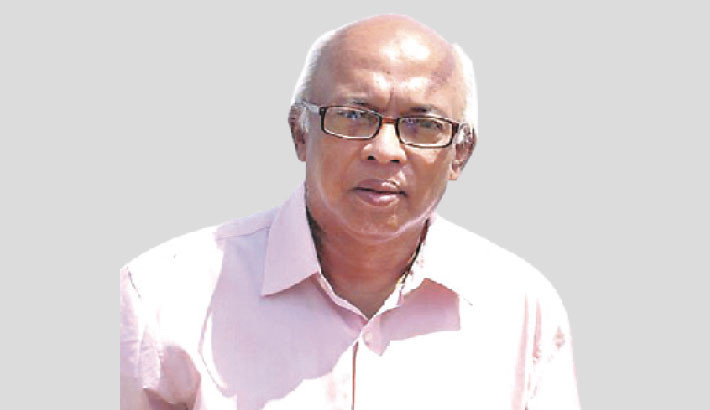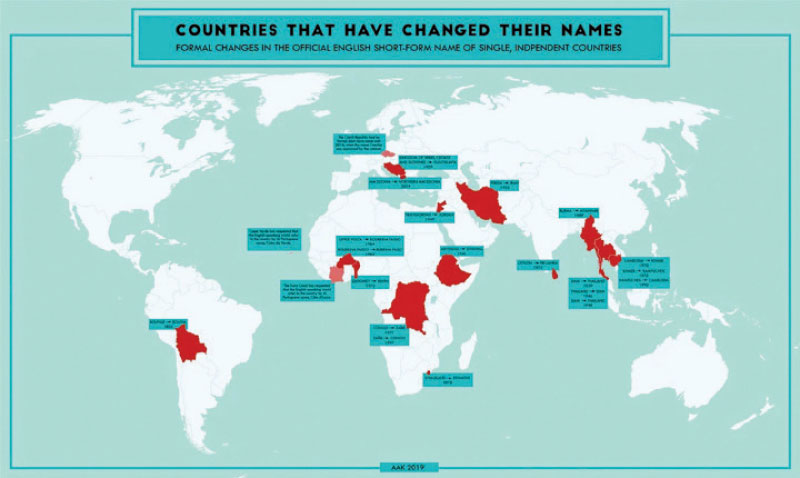
It is rather interesting how, in our lifetime, countries have reinvented themselves through acquiring or adopting new names as their new identities. There have been people, like Nigeria’s Igbos, who were briefly part of a country they thought would guarantee them a respectable niche in the world. But Biafra, the country they lost to Nigeria only three years after it declared independence, is today a memory.
But think of other and happier places around the globe. The country that once was Swaziland is today Eswatini. Or reflect on how Dahomey has become Benin and Upper Volta turned into Burkina Faso. Back in 1957, Kwame Nkrumah decided that the Gold Coast, about to be decolonised, would be renamed Ghana. The process of a change in names, indeed of societies and nations going for a transformation in the way their countries would be known, has continued over the decades.
Once the mighty Soviet Union, officially known under communism as the Union of Soviet Socialist Republics (USSR), collapsed in the early 1990s, all of its constituent republics – Estonia, Latvia, Uzbekistan, Ukraine, Belarus, Kazakhstan and others – went their independent ways. Of the old Soviet Union only Russia, in its new avatar as the Russian Federation, remains. Closer to home, our home that is, we have a country which historically was known as Burma. In the late 1980s, the military, which has been in power since the early 1960s, renamed the place as Myanmar.
Think of our own People’s Republic. Once part of India, post-partition it became East Bengal before being rechristened as East Pakistan. When it became the sovereign state of Bangladesh in December 1971, what till then used to be West Pakistan became Pakistan. Remember too that Sri Lanka was for ages known as Ceylon until its leaders opted for a change in name. In Africa, Tanganyika formed a union with Zanzibar to become the republic of Tanzania. But not all such unions have been happy affairs. The United Arab Republic (UAR), which Gamal Abdel Nasser formed through a union of Egypt and Syria, did not last long.
In the aftermath of the Second World War, Germany lay bifurcated into a pro-West state called the Federal Republic of Germany (FRG) and a communist German Democratic Republic (GDR). The fall of the Berlin Wall brought about the reunification of the country in the 1990s as the FRG. In the Middle East, until the Saud family established a kingdom and called it Saudi Arabia, the place was for generations known simply as Arabia. It is intriguing how the Sauds have had their family name attached to their country. That is not what Reza Shah, the founder of the Pahlavi dynasty, did in his time. He simply decided that Persia, the old country, needed to be born anew as Iran. And that is how Iranians now have had their country since.

In Europe, much permutation and combination has occurred around the new ways in which countries have decided to be known before the rest of the world. Following the fall of communism, Czechoslovakia split up peacefully into the Czech Republic and Slovakia. In nearby Yugoslavia, a state cobbled into shape by Josip Broz Tito, collapsed like a castle in the sand after his death in 1980. Serbia, Bosnia-Herzegovina, Croatia, Slovenia, Montenegro, Kosovo and North Macedonia swiftly emerged, or re-emerged, as states asserting their independence in the emergent new circumstances.
In Asia, Korea remains divided, as a consequence of the war in the early 1950s, into the Democratic People’s Republic of Korea (DPRK) or North Korea and the Republic of Korea (ROK) or South Korea. Cambodia, which was renamed by the Khmer Rouge as Kampuchea in the mid-1970s, went back to being Cambodia once Pol Pot and his regime were driven from power by a Vietnamese invasion in 1979. There has been a slight tweaking around the name of Turkey, which is now officially referred to as Turkiye. Taiwan, which China claims is its renegade province, of course with justification, has projected itself since Chiang Kai-shek and his defeated Kuomintang forces fled to the island in 1949 as the Republic of China.
The Central African Republic was for a few years known, thanks to the quixotic Jean-Bedel Bokassa in the 1970s, as the Central African Empire. An unabashed admirer of Napoleon, Bokassa named himself emperor but after a few years was deposed in a coup d’etat. The country went back to its old identity. Meanwhile, in what is today the Democratic Republic of Congo (DRC), the late kleptocratic dictator Joseph Mobutu gave it the name Zaire. He changed the name of the capital to Kinshasa and even gave himself an African name, Mobutu Sese Seko.
During the process of decolonisation in the 1960s, Northern Rhodesia was reborn as Zambia under the leadership of Kenneth Kaunda. In 1980, the white supremacist regime in Ian Smith’s Rhodesia collapsed, becoming the independent republic of Zimbabwe with Robert Mugabe heading the government. The Malaya we knew in the 1960s and earlier was to become Malaysia. In the early 1970s, what had till then been known as the Trucial States were reborn as the United Arab Emirates (UAE) through the association of Dubai, Abu Dhabi, Sharjah, Ajman, Umm al Quwain, Fujairah and Ras Al Khaimah. East Timor, which gained independence after twenty-four years of Indonesian military occupation in 2002, is officially known as Timor-Leste.
There have been some other changes, often within a few countries. In Pakistan, the province called the North-West Frontier Province (NWFP) was renamed Khyber-Pakhtunkhwa. Some towns bearing colonial-era names were given local names. In India, Bombay became Mumbai, Bangalore became Bengaluru and Calcutta became Kolkata. In China, Peking was rechristened as Beijing, while changes in the spelling and pronunciation of people’s names were also brought in. For instance, Mao Tse-tung became Mao Zedong, Chou Enlai became Zhou Enlai, Liu Shao-chi became Liu Shaoqi and Deng Tsiao-ping became Deng Xiaoping. In Cambodia, the Khmer Rouge’s Pol Pot was earlier known as Saloth Sar.
Remarkable changes have occurred in our lifetime. Nations have reinvented themselves through emerging as independent republics. Monarchies have made their way out of people’s lives, though a handful remain. Kingdoms, such as Nepal’s, are currently republics operating under elected governments. Politics has changed in quality and substance, not always for the better.
____________________________________
Syed Badrul Ahsan writes on politics, diplomacy and history


